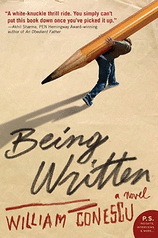Richard North Patterson
Richard North Patterson's new book is Eclipse, "the spellbinding story of an American lawyer who takes on a nearly impossible case—the defense of an African freedom fighter against his corrupt government’s charge of murder."
From a Q & A about the book at the publisher's website:
You acknowledge in your afterword that ECLIPSE is based loosely upon the life and death of Ken Saro-Wiwa, Nigeria’s courageous human rights and environmental activist who was hung by the country’s brutal dictator fifteen years ago. For those of us who don’t remember that story, please tell us a bit about him and why he remains an important figure.Read the complete Q & A.
Ken Saro-Wiwa was a gifted novelist who created a force unique to Nigeria: a mass nonviolent movement among his ethnic group, the Ogoni, to fight the environmental and human rights abuses caused by the alliance between the oil industry and Nigeria’s corrupt autocracy. While the extraction of oil from the Niger delta enriched the government and the oil companies, it left the delta’s people more impoverished and their lands and water despoiled. Saro-Wiwa’s defiance ultimately led to his execution in 1994 by the country’s kleptocratic dictator, General Suni Abacha, after a trial based on dubious charges that Saro-Wiwa had instigated the death of several Ogoni chiefs. A tragic coda is that although Saro-Wiwa was widely admired in the West, the oil-dependent democracies that profess their devotion to human rights did little to save him.
The tragedy of Saro-Wiwa is piercingly salient today. In the years since his death, the industrialized nations have become more desperate for oil to preserve their own power and wealth. Central to my story is that the oil-rich Niger delta is ever more despoiled, and the protest movement of Saro-Wiwa has been replaced by predatory militia who steal oil and siphon it to the black market, while spreading violence throughout the region and maintaining corrupt but shadowy alliances with the government. And our addiction to oil wholly marginalizes any concern we have with the injustices Saro-Wiwa sacrificed his life to fight.
Finally, the courtroom drama that climaxes Eclipse is based on the show trial in which Saro-Wiwa was condemned—a Kafkaesque perversion of the forms of justice.
--Marshal Zeringue



































